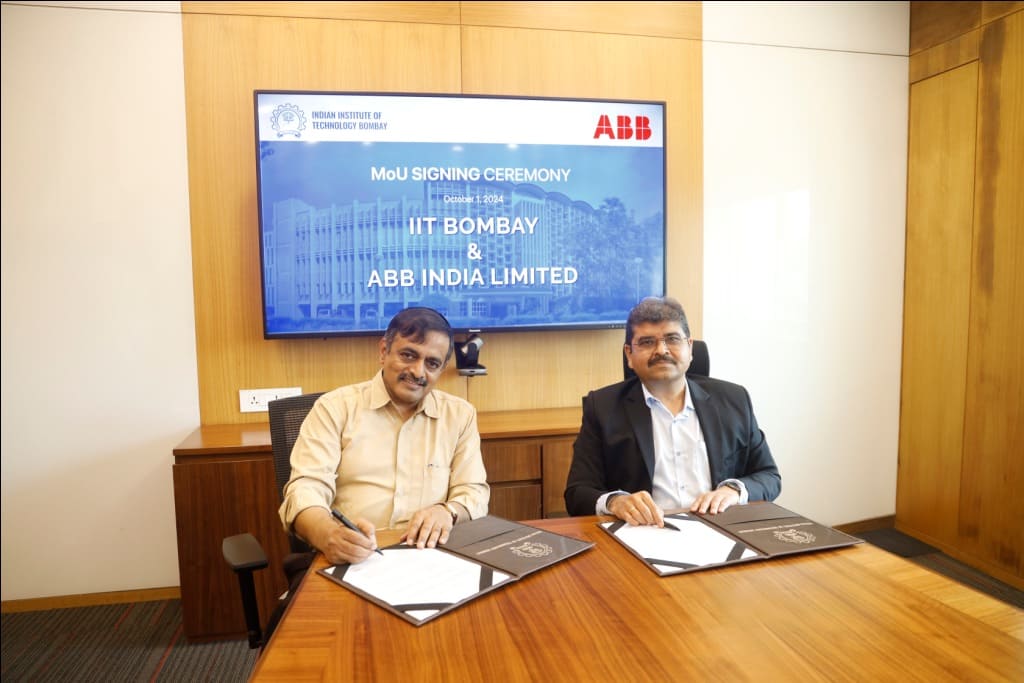Mumbai, India: The Indian Institute of Technology Bombay (IIT Bombay) has partnered with ABB India to establish a cutting-edge teaching laboratory for electrical machines and drives at the Department of Energy Science and Engineering on its campus. This partnership aims to provide undergraduate and postgraduate students with hands-on experience using modern industrial equipment and prepare undergraduate and post-graduate students for future roles in the fast-evolving energy and industrial sectors while promoting environmental sustainability.
The teaching lab will feature energy-efficient, mechanically coupled electrical machine sets, variable frequency drives (VFDs), and programmable logic controllers (PLCs), focusing on delivering practical training in electrical machines and drives. The laboratory will emulate various industrial applications, including those used in wind turbine generators and electric vehicle drivetrains, ensuring that students understand modern energy systems comprehensively. With support from ABB India, the lab will help foster the next generation of engineers, equipped with the knowledge and skills needed to innovate once they join the industry in the future sustainably.
Commenting on the partnership, Sanjeev Arora, President, Motion Business, ABB India said, “We are humbled to partner with the premier education institute IIT Bombay to support the institute in nurturing the next generation of engineers who are well-equipped to address the evolving demands of the industrial sectors with a focus on energy efficiency and conservation. The advanced technologies used in the new lab are innovative and sustainable in nature, ensuring that future engineers prioritize sustainability in their careers while contributing to a more resource-efficient world.”
Electrical machines and drives are integral to a wide array of industrial applications. With advancements in power electronics and control strategies, different kinds of electrical machines have emerged to meet application-specific performance needs. As industries increasingly adopt modern energy-efficient technologies, it is imperative for engineering students and research graduates to have a strong understanding of these innovations.
Highlighting the significance of this partnership, Prof. Shireesh Kedare, Director of IIT Bombay, remarked, “IIT Bombay’s partnership with ABB India marks a significant step toward empowering our students with advanced technical expertise and a deep understanding of sustainable energy systems. This state-of-the-art lab will provide immersive, hands-on training in cutting-edge technologies that mirror real-world industrial applications. Our goal is to nurture engineers who are not only skilled innovators but also champions of energy efficiency and environmental stewardship, prepared to lead the way in shaping a sustainable and resource-efficient future.”
Previously, IIT Roorkee had partnered with ABB India for technical cooperation to construct an operational smart electricity distribution network and management system (SDNMS) on its campus. In partnership with the National Institute of Technical Teachers Training & Research (NITTTR) Chandigarh, ABB India set up a first-of-its-kind multi-physics digital simulation center in 2019. In addition, the company runs other up-skilling programs and engages with the youth to make them employable.
In Faridabad, ABB India collaborated with Udayan Care to run a Community Information Technology and Skill Center. The center aims to support girls from economically disadvantaged families in becoming self-reliant by undertaking IT and vocational training. ABB India had also signed an MoU to refurbish the Government Industrial Training Institute (ITI) located in the Peenya Industrial Area, one of the oldest industrial areas in Bengaluru, under its CSR initiatives.
Disclaimer: This media release is auto-generated. The CSR Journal is not responsible for the content.


